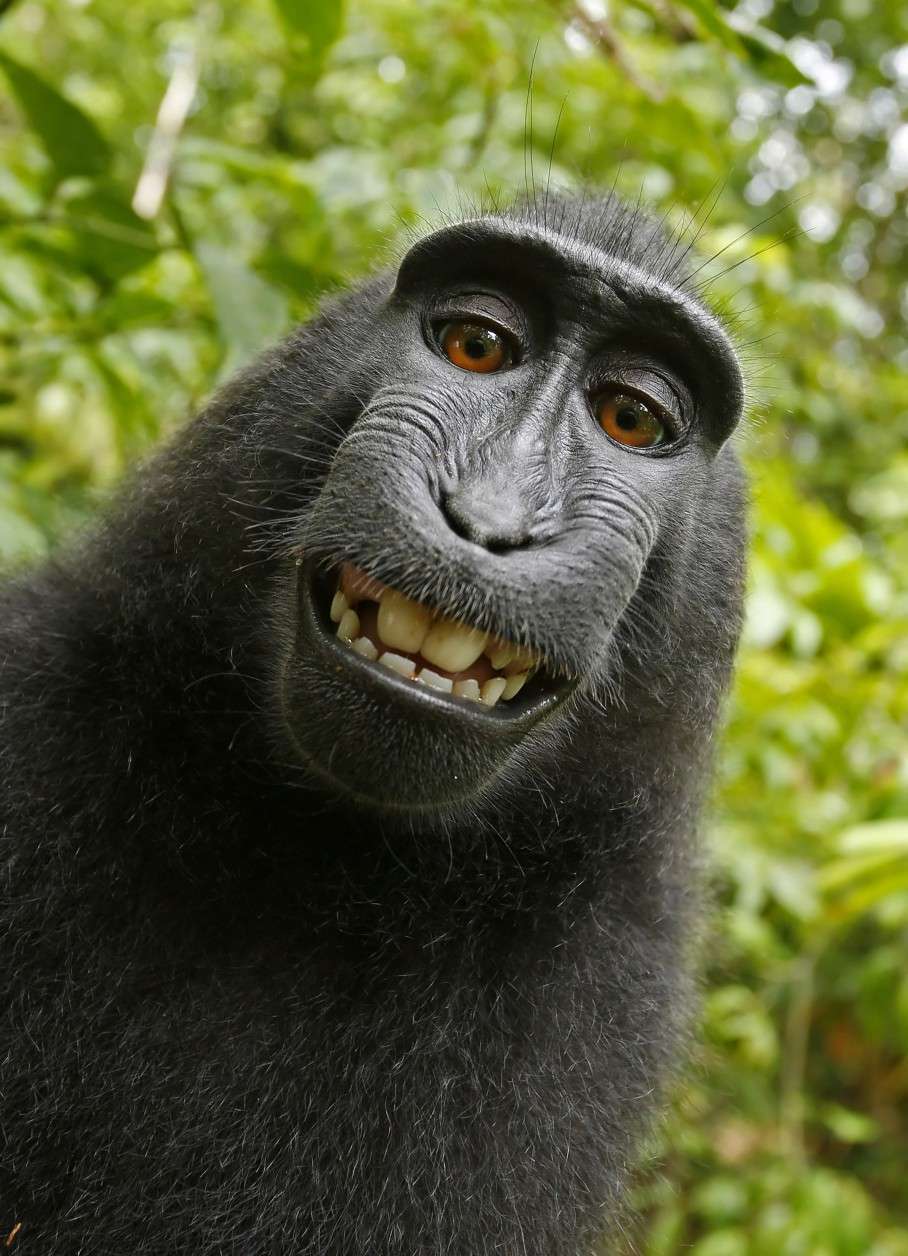The Volokh Conspiracy
Mostly law professors | Sometimes contrarian | Often libertarian | Always independent
I'd be smiling, too, if I owned the copyright to this photograph
He's back! Naruto, the Monkey Photographer.

The question of who (if anyone) owns the copyright to this (spectacular) photograph is an issue that won't go away. You may recall the origins of this tale; as the president (and sole member) of the exclusive fraternity of ex-primatologists who went on to teach and practice copyright law, I have endeavored to keep VC readers up to date on this story, beginning here in 2011 and continuing here and here. The basic problem: according to a professional wildlife photographer (David Slater), the owner of the camera on which the photo was taken, it was Naruto him (or her?) self who snapped this picture, after his/her group of Indonesian macaques invaded Slater's campsite where the camera was set up on a tripod and ready to go.
The question of whether (a) Slater, (b) the monkey or (c) nobody owns the copyright to this photo - indeed, the question of whether there is any copyright protection at all for the photo - is not, as I said before, an "entirely ridiculous one."
OK, it is a ridiculous one, but it is at least closely related to some very difficult and interesting copyright questions concerning the requirement (if there is one) that human creativity is a requirement for copyright to exist in a work of authorship - questions that come up in contexts ranging from the ridiculous (creations by psychics ostensibly "channeling" voices from beyond the grave, animal creations - elephant drawings, chimpanzee-created music) to the more sublime (the copyright status of works "authored" by computer programs or Artificial Intelligence engines).
PETA, the animal rights organization, has now joined the fray. It has filed suit in federal district court (Northern District of CA) on behalf of Naruto
a six-year-old male member of the Macaca nigra species, also known as a crested macaque, residing on the island of Sulawesi, Indonesia [who] cannot independently bring this action due to inaccessibility and incapacity.
asserting that Naruto owns the copyright in the photo (and that Slater has infringed Naruto's copyright by publishing a book containing this and other "monkey selfies"). (The complaint in the case - Naruto, a Crested Macaque, by and through his Next Friends, People for the Ethical Treatment of Animals, Inc. and ANTJE ENGELHARDT, Ph.D. v David Slater - can be found here.) PETA is requesting that Slater disgorge all of his "net proceeds from the sale, licensing and other commercial use of the Monkey Selfies," which would be put into a PETA-managed fund "to be used solely for the benefit of Naruto, his community of crested macaques, and preservation of their habitat."
I admit I didn't see this one coming. It is easy - indeed, it is irresistible - to milk this one for laughs. To begin with: How do they know the plaintiff-in-interest's name is "Naruto"? [There's an old joke: Stranger to Farmer: "That's a real nice hog you got there - what's his name?" Farmer to Stranger: "Don't know for sure, but we call him Bill."] Or that Naruto is 6 years old? And if Naruto owns the copyright, how do I negotiate with him to license use of the photo? And to whom does ownership pass when he dies? Etc.
But as I said before, the copyright question that the case poses - whether non-humans can be considered "authors" - is not entirely trivial, especially in a world of robots, self-driving cars, and music-generating software. It has an interesting constitutional dimension, inasmuch as the Constitution gives Congress only the power to grant "authors" rights in their "writings." [Originalists will presumably have a field day tracking down the Framers' view of non-human animals as "authors."]
And I also have a feeling that the ridiculous idea that non-human animals have "rights" of any kind (including ownership rights) will seem less and less ridiculous over time, and that the presentists of the future will look back and shudder at the manner in which we treated animals and wonder how we could have been so morally obtuse (somewhat in the way today we view slaveholders of days gone by).


Show Comments (0)